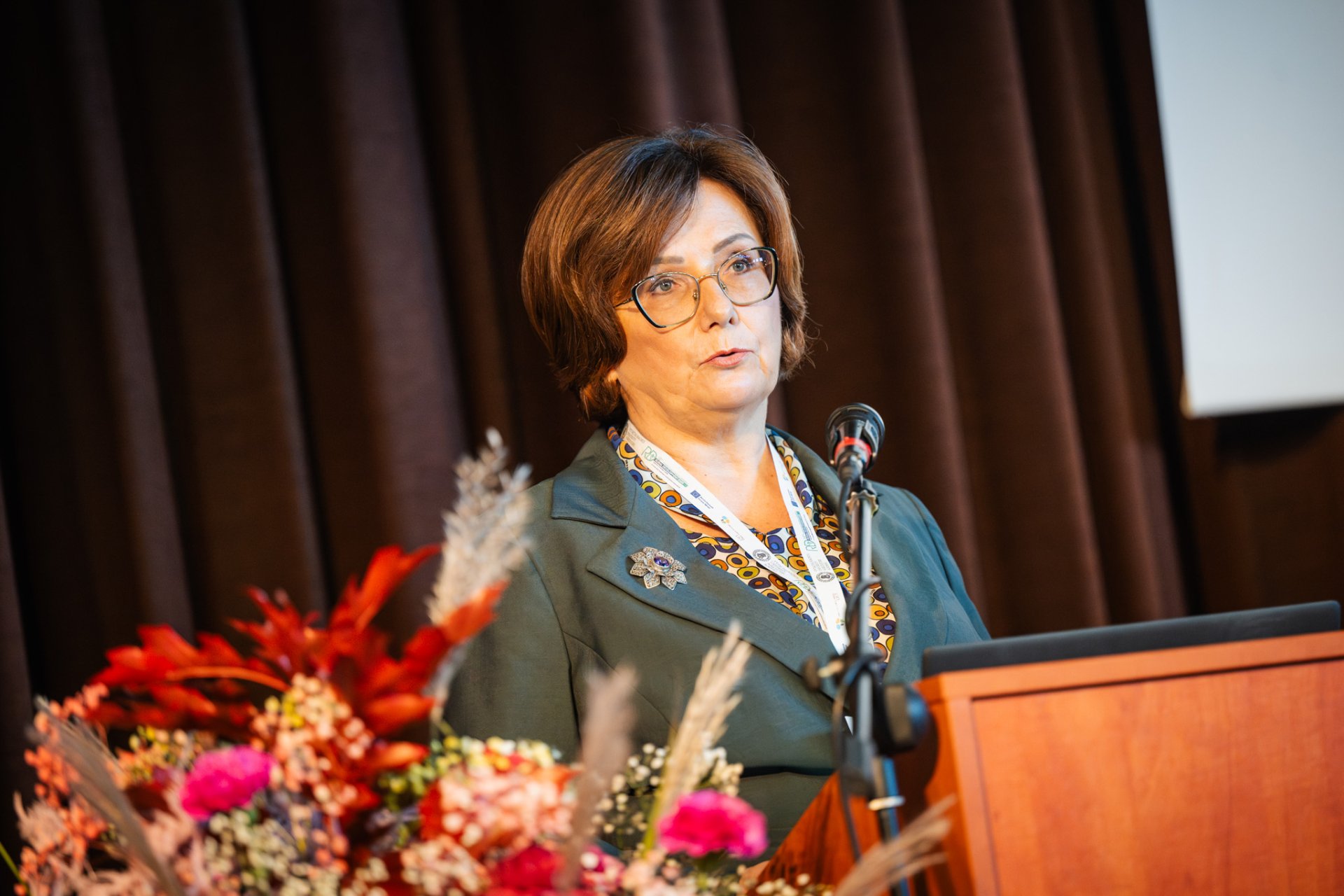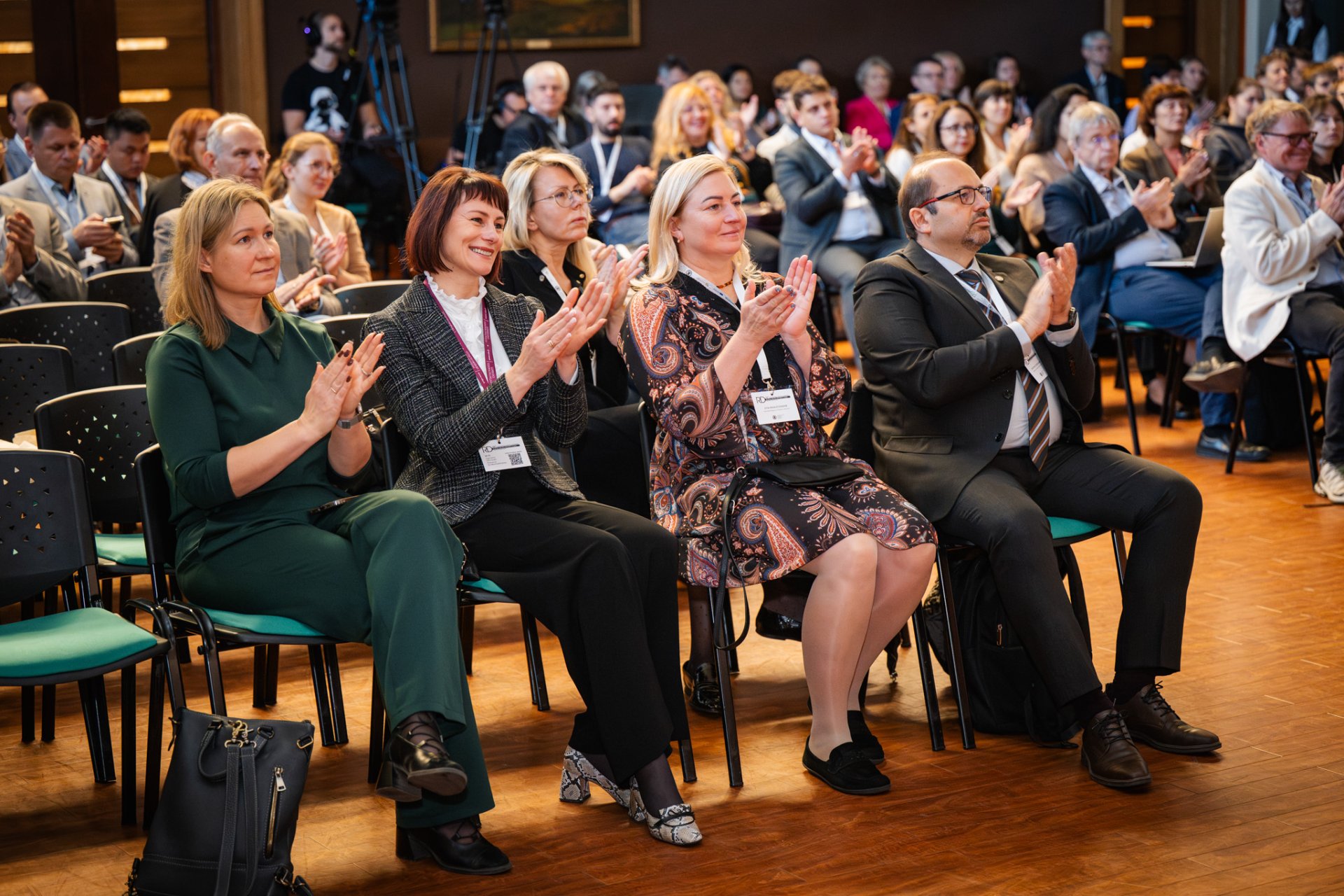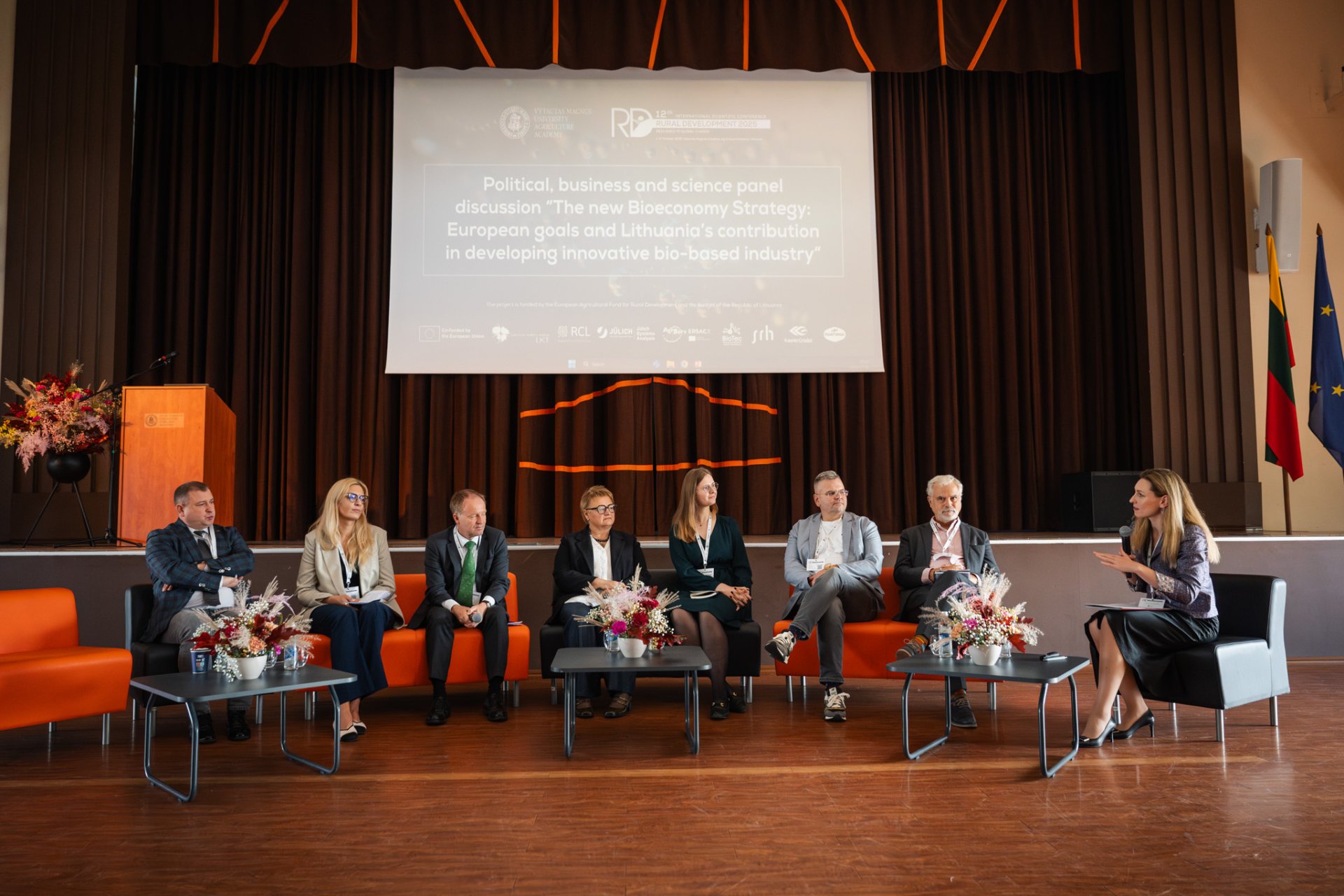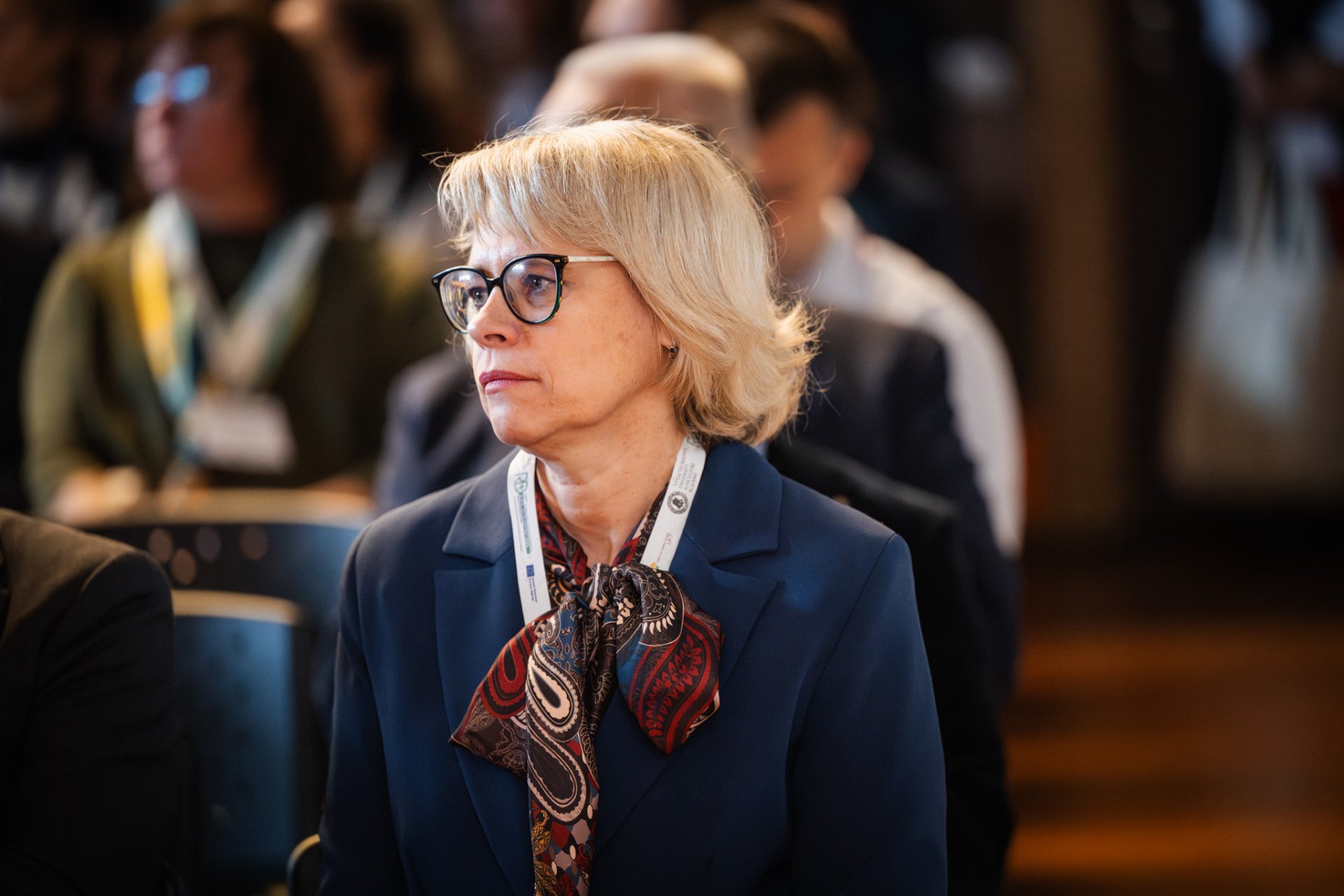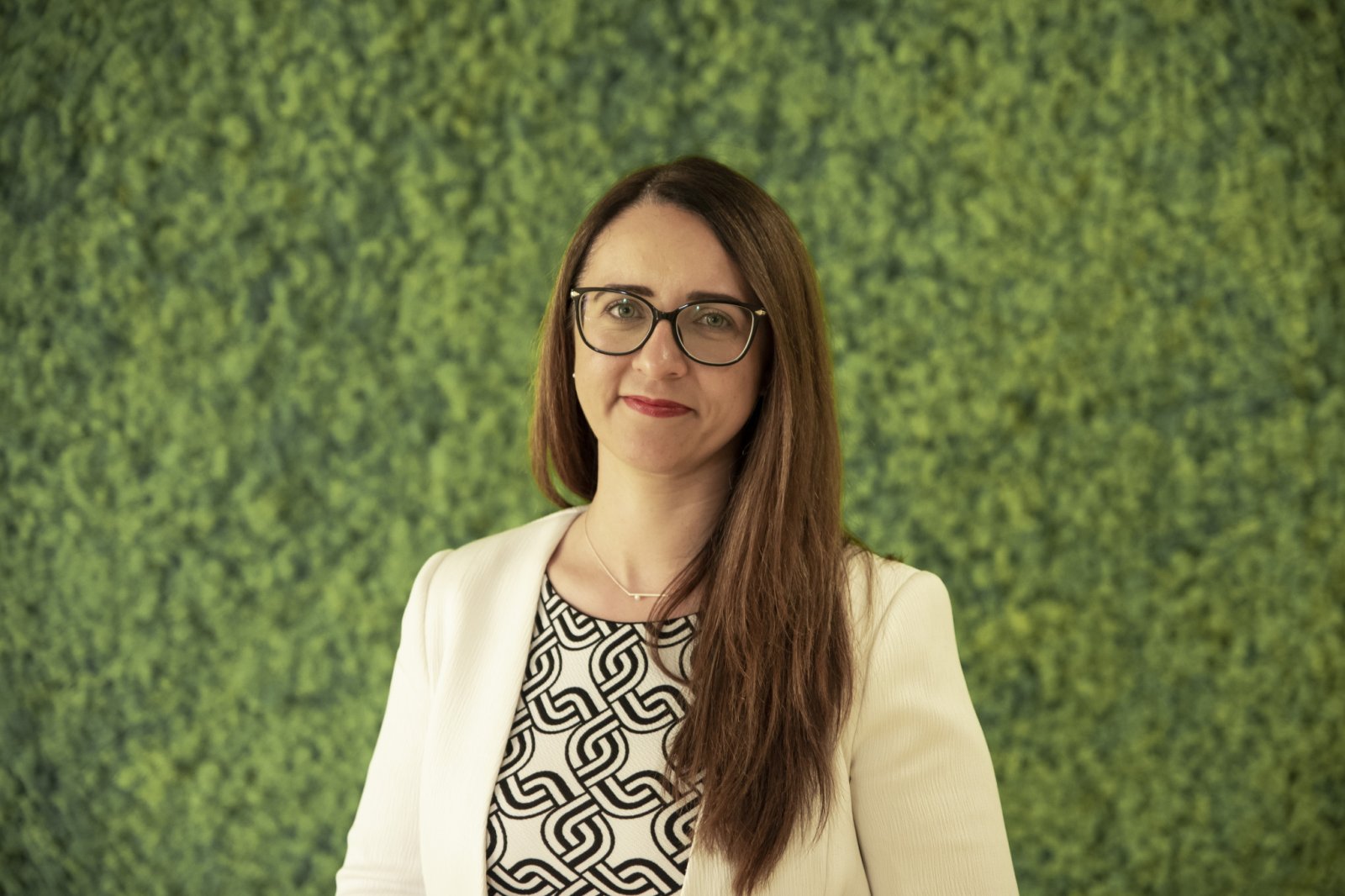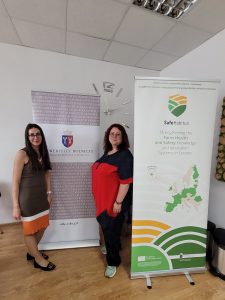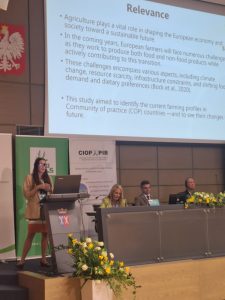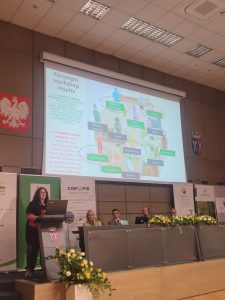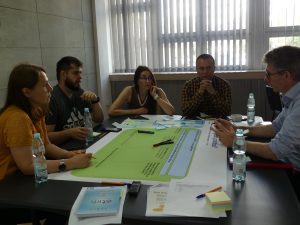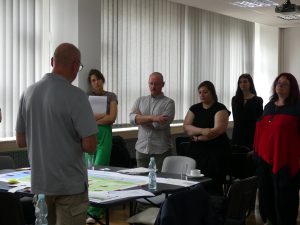International Scientific Conference “Rural Development 2025: Resilience to Global Change” – A Comprehensive Approach to a Sustainable Future
On October 1–3, the Vytautas Magnus University Agriculture Academy (VMU AA) hosted for the twelfth time the international scientific conference “Rural Development 2025: Resilience to Global Change”, which became a vibrant hub of knowledge exchange and international dialogue. This year’s conference theme – resilience to global changes – encouraged participants to share experience and insights and to address issues related to climate change, biodiversity loss, geopolitical challenges, and other regional and global problems in order to develop effective and sustainable rural development strategies.
Sharing Knowledge as a Driver of Meaningful Change
This year, the international scientific conference “Rural Development 2025: Resilience to Global Change” brought together 366 scientists, researchers, and guests from 22 countries – Finland, Sweden, Japan, Germany, Greece, Malaysia, Poland, Latvia, Spain, the Czech Republic, Slovakia, Albania, Kenya, Estonia, Portugal, Belgium, Mozambique, Morocco, the Netherlands, France, and Ukraine.
The event stood out for its high level of international engagement, having been organized in cooperation with global partners: AgroSERV – Agroecology European Research Infrastructure Services (France) and Forschungszentrum Jülich (Germany).
In her welcoming address, Professor Dr. Astrida Miceikienė, VMU Vice-Rector for Strategic Development and Finance and Chair of the Conference Scientific Committee, emphasized that this well-established conference unites scientists, policymakers, practitioners, and community leaders from various countries.
“The VMU Agriculture Academy is proud to serve as a space where knowledge, ideas, and experience are shared and exchanged in pursuit of a sustainable future.
This year’s central theme – resilience to change – is of particular importance. Agriculture, forestry, and rural communities worldwide are facing tremendous challenges: climate change, biodiversity loss, geopolitical shifts, bioeconomy development, demographic and social transitions, and more.
Therefore, this conference is dedicated to dialogue, exchange, and inspiration. I hope that the knowledge shared here will contribute to meaningful transformations within communities and beyond,” said Prof. Dr. A. Miceikienė.
Professor Dr. Astrida Miceikienė, VMU Vice-Rector for Strategic Development and Finance and Chair of the Conference Scientific Committee
New Perspectives: From Research to Practice
Transitioning toward a sustainable agricultural system requires a strong research infrastructure that bridges disciplines and fosters innovation.
Dr. Michel Boër, Director General of AnaEE-ERIC, the European Research Infrastructure Consortium for the Analysis and Experimentation on Ecosystems, delivered a presentation entitled “Transdisciplinary services for the research community in agroecology: the AgroServ project”. Dr. Boër has an exceptional career as a Research Director in Astrophysics at CNRS, contributing to such discoveries as gravitational waves, and now leads major initiatives in the field of agroecology. Presenting the five-year project, he explained that its goal is to support research and innovation in agriculture and agroecology, addressing the complex challenges faced by agricultural systems – including the need to feed a growing global population sustainably, combat climate change, preserve natural resources, and enhance biodiversity.
Resilient forests are vital for rural development, biodiversity, and climate adaptation.
Professor Erik Dahl Kjær of the University of Copenhagen, one of Europe’s foremost experts in forest genetics, has published over 250 scientific papers and leads a research group studying the adaptive potential of European tree species – including the latest findings in epigenetics and microbiomes.
During the conference, he presented strategies for developing forests and trees resilient and adaptive to climate change:
“We must be prepared for global changes. Priority should be given to flexible and robust measures that leave room for adaptation. International cooperation in managing forest genetic diversity is essential. Socially feasible and acceptable solutions are equally necessary. Science can combine old and new methods – and has much to offer. Let us trust in diversity and learn from nature,” said Prof. Kjær.
Sustainability in education and regional competence development is essential for a thriving bioeconomy.
Dr. Mona-Anitta Riihimäki, Dean of the School of Biotechnology and Natural Resources (Finland), whose research focuses on sustainability in the food chain and higher education governance, is a leading figure in Finland’s bioeconomy education initiatives, chairing national and international committees and contributing to the evaluation of higher education programs.
In her presentation “AKIS in Finland and the role of universities of applied sciences in regional competence creation in Bioeconomy” Dr. Riihimäki highlighted several key directions: ensuring effective knowledge transfer and strengthening the link between research and practice both within and beyond the agricultural sector; promoting strong and cross-sectoral knowledge exchange, training, and advisory services; reinforcing cross-disciplinary innovation in and beyond agriculture; supporting digital transformation in and beyond the agricultural sector.
Innovative Solutions for a Resilient and Efficient Agriculture
The ambition to ensure food security while protecting ecosystems requires plant health and sustainable farming solutions.
Professor Dimitrios Tsitsigiannis from the Agricultural University of Athens (Greece), with over 30 years of experience in plant pathology, leads a research group that develops advanced integrated plant protection strategies combining biological control, artificial intelligence, and digital precision agriculture.
In his presentation “The Power of Digital Technologies for Plant and Environmental Protection” Prof. Tsitsigiannis outlined breakthroughs in agricultural biotechnology and plant disease management:
“Agricultural biotechnologies are at the forefront of addressing climate change challenges and ensuring food security.
Advances in synthetic biology, microbiome-based solutions, and RNA-based plant protection open new levels of resilience.
AI-driven breeding platforms accelerate the creation of drought-resistant seeds, disease-tolerant crops, and biologically enhanced fertilizers.
Microbiome-based innovations enrich soil biodiversity and optimize plant nutrition, ensuring higher yields even under extreme conditions,” he said.
Addressing global challenges requires innovative thinking at the intersection of land management, climate change adaptation, and sustainable livelihoods.
Professor Hossein Azadi from Ghent University (Belgium), who holds doctorates in agricultural economics and human geography, has published nearly 400 peer-reviewed scientific papers and ranks among the top 3% of scientists worldwide.
In his presentation “Resilient Agriculture through the Lens of Smallholder Farmers: Developing Tip-Tap Early Warning System” Prof. Azadi emphasized that agriculture faces growing risks from climate change, where even small environmental fluctuations can cause irreversible, productivity-threatening impacts. Smallholders, being particularly vulnerable, often lack timely access to early warning mechanisms to mitigate such risks.
To address this gap, the Tip-Tap Early Warning System was introduced – an innovative, proactive monitoring framework designed to anticipate and prevent climate disruptions before they occur. The system strategically identifies and responds to critical tipping points to enhance resilience to climate change.
Innovation at the crossroads of biology and digital technologies is essential to ensure next-generation sustainable agricultural systems.
Associate Professor Dr. Viktorija Vaštakaitė-Kairienė, who combines plant physiology with practical agronomy in her research, actively contributes to the advancement of sustainable agriculture both in Lithuania and across Europe.
“Lithuania is building leadership in the bioeconomy – an economy driven by innovation.
There is a clear national commitment: the government, universities, and industry work hand in hand, recognizing agriculture, forestry, and biotechnology as engines of sustainable growth.
With a century-long legacy, the VMU Agriculture Academy holds a central position, and its academic division – the Bioeconomy Research Institute – serves as a research hub focused on digital agriculture, biotechnology, and climate-resilient farming.
These efforts not only address local challenges but also strengthen Lithuania’s role as a European source of knowledge. Lithuanian experts contribute to shaping EU policy and participate in international projects,” said the Deputy Director of the VMU Agriculture Academy’s Bioeconomy Research Institute.
Policy, Science, and Business Discussion: Highlights of the Forthcoming EU Bioeconomy Strategy
During the conference, Dr. Michael Losch, representative of the European Commission’s Directorate-General for Agriculture and Rural Development (DG AGRI), presented the forthcoming EU Bioeconomy Strategy.
Dr. Rasa Pakeltienė, coordinator of the Lithuanian Bioeconomy HUB and Associate Professor at the VMU Agriculture Academy’s Faculty of Bioeconomy Development, shared insights from the perspective of the national strategy and the Lithuanian Bioeconomy HUB participants.
A policy–science–business discussion followed these two keynotes, joined by Dalia Miniataitė, Senior Adviser at the Ministry of Agriculture of the Republic of Lithuania; Rugilė Skvarnavičiūtė, Product Strategist at the Lithuanian Investment Promotion Agency “Invest Lithuania”; Dainius Kižauskas, Director of the Association of Lithuanian Agricultural Cooperatives; Justinas Taruška, CEO of the biotechnology company “Nando”; and Dr. Michel Boër, Director General of AnaEE-ERIC – the European Research Infrastructure Consortium for the Analysis and Experimentation on Ecosystems.
The discussion, moderated by Virginija Kargytė, Vice President of the association “LithuaniaBIO”, explored the key directions of the upcoming EU Bioeconomy Strategy, major trends in Europe’s bioeconomy industries, and Lithuania’s potential to expand the production of innovative, high value-added bioeconomic products and related services.
Integrating Disciplines – A Comprehensive Approach to Contemporary Issues
During the conference, scholars exchanged insights and experiences across four thematic sections:
“Biosystems Engineering for Sustainability”, “A Multifunctional Approach to the Sustainable Use of Biological Resources”, “Climate-Resilient Agriculture and Food Technologies” and “Social Research and Innovations for Strengthening Rural Areas.”
According to Dr. Laima Skauronė, Researcher at the VMU Agriculture Academy’s Bioeconomy Research Institute and Chair of the Conference Organizing Committee, the event integrated not only agricultural topics but also perspectives from the social, engineering, environmental, economic, and political sciences.
“Such integration of different disciplines enables a complex exploration of rural development issues – from technological innovations to social solutions,” said Dr. Skauronė.
She added that the international conference focused on the challenges and opportunities of sustainable rural development and transformation, bioeconomy growth, agroinnovation deployment, and social responsibility in the context of global change.
“We are united by a shared goal and vision – to examine, discuss, and strategize how bioeconomy businesses and rural communities can adapt, thrive, and lead in an era of rapid and often unpredictable transformation,”
emphasized Professor Dr. Astrida Miceikienė, VMU Vice-Rector for Strategic Development and Finance and Chair of the Conference Scientific Committee.
As per tradition, the conference also featured a poster session, providing researchers with the opportunity to present their work visually and engage in direct discussions with attendees. These sessions enriched the core conference themes through additional topics and perspectives.
Dr. Laima Skauronė, Researcher at the VMU Agriculture Academy’s Bioeconomy Research Institute and Chair of the Conference Organizing Committee
International Cooperation as a Catalyst for New Scientific Partnerships
Dr. Laima Skauronė, Researcher at the VMU Agriculture Academy’s Bioeconomy Research Institute and Chair of the Conference Organizing Committee, expressed delight at the large number of participants – attendees came from 22 different countries.
In total, the conference featured 157 presentations, including six inspiring plenary lectures.
According to Dr. Skauronė, the plenary and section discussions revealed that resilience to global changes in the context of rural development is a crucial topic not only for Europe but also for global agricultural sustainability.
She emphasized that the VMU Agriculture Academy has become a platform for sharing best practices and experiences:
“Participants from various countries had the opportunity to compare their research findings in a broader international context, share insights, and learn from one another.
For example, successful rural development initiatives in France, Germany, or Japan may inspire new solutions in Lithuania – and vice versa.
Internationality also fosters the creation of new research collaborations: many scholars who meet at this conference later embark on joint projects and prepare international research proposals.
This long-term impact extends well beyond the event itself.”
Dr. Skauronė added that the broad geographical diversity of participants created a multicultural environment, promoting a wider understanding of global change, challenges, and problems.
“Such openness to the world increases both the visibility of the University and of Lithuania in the international scientific arena, showcasing our active role in addressing issues of rural development and bioeconomy resilience to global changes,” she said.
The 12th International Scientific Conference “Rural Development 2025: Resilience to Global Change” stood out for its global scope – in both content and participation.
Foreign guests were especially impressed by the cultural program of the event – the Gala Dinner evening, filled with Lithuanian traditions. The warm atmosphere was created by the VMU Agriculture Academy folk band “Ūkininkas” and the dance ensemble “Sėja”. Music, songs, and dances became a cultural bridge connecting participants from different countries and revealed the spirit of Lithuanian hospitality and international fellowship.
Conference participants also had the opportunity to explore Kaunas city, visiting historical and cultural landmarks during a guided tour, and on the final day, enjoyed the serene beauty of the Birštonas resort, which left a lasting impression with its cozy atmosphere and harmony with nature.
Summarizing the event, Professor Dr. Astrida Miceikienė, Chair of the Scientific Committee, stated that although the next conference will take place only in 2027, planning has already begun regarding its thematic continuity, new international partnerships, and a deeper dialogue between science and practice – to further strengthen the University’s role in shaping Europe’s rural development and bioeconomy directions.
The organizers extend sincere gratitude to the conference partners and sponsors – AgroServ ERSAC, Jülich Forschungszentrum, SRH University, the Lithuanian Rural Network, the Research Council of Lithuania, the Bioeconomy Research Institute’s Centre of Excellence for Bioeconomy Research (BioTEC) at the VMU Agriculture Academy, AB Kauno Grūdai, and UAB Mantinga – for their significant contribution and support.
The event was implemented under Project No. LKT-PK-24-2-06554-PR001, financed through the Lithuanian Rural Network measure of the Lithuanian Agricultural and Rural Development 2023–2027 Strategic Plan.
The project was supported by the European Agricultural Fund for Rural Development (EAFRD) and the budget of the Republic of Lithuania.
The scientific event also received funding from the Research Council of Lithuania (LMTLT) under Agreement No. P-MOR-25-23.
New VMU Rector Prof. Dr. Dabašinskienė: a University Must Also Be a Centre of Moral Leadership
As of October 1, the new rector of Vytautas Magnus University (VMU) begins her work – academician and professor Ineta Dabašinskienė. “Leading a university is a huge responsibility, but also an opportunity to create meaning: to unite the academic community for a common task. Our goal is not only to respond to today’s needs, but also to shape the horizons of the future. A university is strong to the extent that it remains faithful to its fundamental values: academic freedom, critical thinking, creativity, and holistic education. This conviction, grounded in the principles of liberal arts, is our firmest support and our main direction,” notes the VMU rector, in a conversation discussing the universities of the future, community-based leadership, today’s students’ values, and ways to unwind after intensive work.
What role do you see for universities today and in the future?
Universities must remain centres of knowledge and free inquiry, while at the same time addressing contemporary needs linked to technological, economic, and social innovations. For example, artificial intelligence – already a part of everyday life – should remain a helper, not a decision-maker replacing humans; therefore, it is essential to cultivate the ability to critically evaluate these tools and use them responsibly.
Resilience is particularly important for universities today – and here we are speaking not only about infrastructure or technologies. To operate successfully amid geopolitical and economic unpredictability and various risks, and still promote long-term change, universities must maintain a moral backbone, strengthen a culture of trust, and set an example of responsibility for society.
I also see the university of the future as a hotbed of innovation and progress. Here, diverse expert competencies are acquired, interdisciplinary modes of working are understood and practiced, and free, responsible, noble individuals are educated: people who have the courage to act, to take risks, and to make mistakes.
A university must also be a place of moral leadership. Living in an era of information noise and competition, we must strive to create an atmosphere of trust, dialogue, and cooperation, defend universal human values, and remain open to the world’s diversity. A university must set an example that honesty and compassion can change the world. In my vision, I see VMU as a university that unites tradition and modernity, is open, bold, responsible, empathetic, and capable of surprising both Lithuania and the world with its achievements.
How do you understand leadership? Which qualities do you value most in a leader?
I take a contemporary view of leadership: I do not see a leader as strict and all-knowing. Much more important is a community-minded leader who listens. I value leadership that is democratic – based first and foremost on dialogue and empathy. A university is alive only when each of its members feels responsible for change.
Therefore, among my first tasks will be to involve the community in decision-making. Decisions should not be made behind closed doors but should be born in discussions where different voices and opinions are heard. We will organize working groups dedicated to various essential areas of university activity: from the research ecosystem and budget planning to the integration of artificial intelligence and alumni engagement.
What do you see as the biggest challenges in Lithuanian higher education?
I see great potential for our country to stand out internationally for the quality of its higher education. But I also see three core problems: weak trust between the state and universities, a demographic crisis, and constant reforms that destabilize the entire system.
Lithuanian higher education institutions are strong, but they could compete even more in the world and in Europe if there were less control and more trust. Excessive regulations and lengthy approval procedures hinder innovation. My aim is less bureaucracy and more real experimentation and digitalization.
University autonomy must be understood as a necessary condition for high-quality activity and for the advancement of research and studies. This is genuine academic freedom: the right to doubt, discuss, and pose questions. It is also a commitment to strive for the highest quality, to be accountable for one’s words and actions, to defend one’s views, and to serve as a moral compass. All of this begins with trust: the state must allow universities to operate more freely, and universities, in turn, should demonstrate transparency and results.
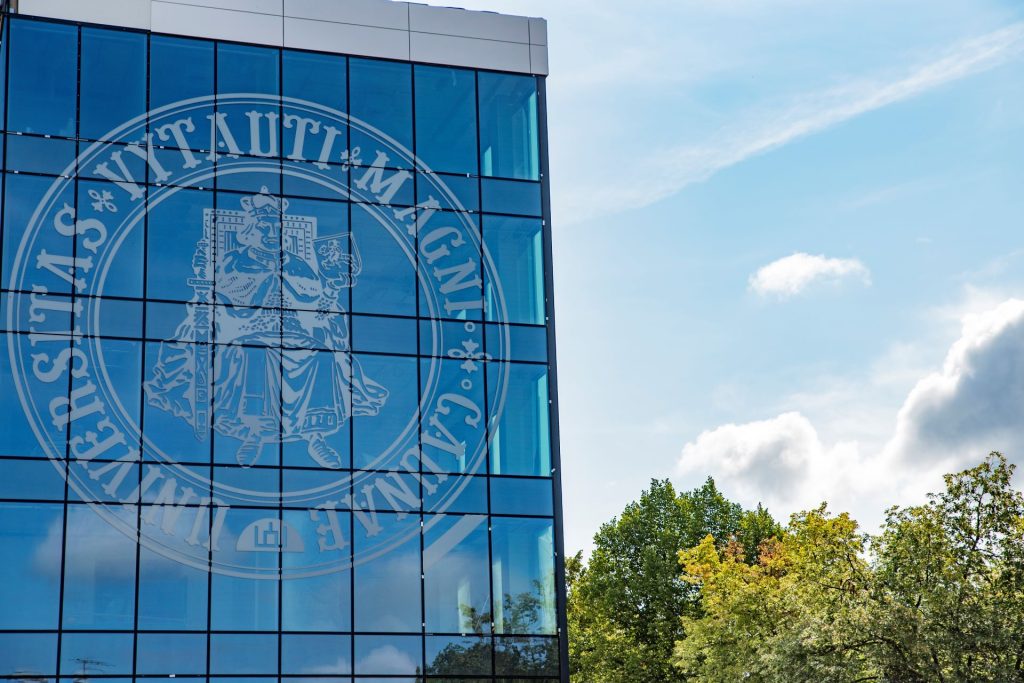
How do you see today’s youth and what could attract them to the university today?
Increasingly, we see that young people choose studies not for a piece of paper with a stamp, but for the opportunity to act and create. It matters to them that studies allow for experimentation, joining different teams, and solving issues that truly change the world: from climate change to social equality or the ethics of artificial intelligence. VMU’s response is studies that take place not only in the classroom but also in real projects. Here, students see the entire process – from idea to implementation – learning to collaborate, take responsibility, and take real action.
VMU will offer an increasingly interdisciplinary path: joint modules where technology, languages, law, or business meet, along with the creative freedom to try oneself in different fields. We want – and will strive – to ensure that during their studies, young people discover not only professional knowledge but also themselves: their strengths, talents, and calling. That they gain practical experience, engage in meaningful activity, and feel that they can not only learn but also create, contribute, and effect change.
It is very important to understand that the University is a special place in life where ideas and friendships are born, social networks are formed, and circles of like-minded people take shape. Students meet friends with whom they will share experiences for a lifetime and with whom they will create joint projects, businesses, or ideas for the future. It is not only the content of studies but also a community of life that becomes a support for the entire path ahead.
In your program you name four strategic directions on which VMU’s future will be based. What are the most important priorities for the university’s future?
A responsible community: an academic family in which transparency, mutual support, and empathy are everyday realities, and where faculty autonomy and the student voice have real power to change decisions. Open studies: a modern, flexible system grounded in renewed liberal arts principles, enabling more harmonized study modes and lengths, in which theoretical insights are reinforced in real situations, developing both professional and life skills.
Ambitious research: a strategic direction that fosters international projects based on innovation, strengthens doctoral studies, and promotes open science principles so that Lithuania’s distinctive research fields become part of the global academic community. I believe we must participate more actively in ensuring the region’s and the country’s future security – the university is a space where science, technology, innovation, and practical solutions meet. By collaborating with partners in business, industry, the state, and municipalities, we must concentrate academic potential to create not only knowledge but also products and value that meet society’s real needs today. Finally, resilient infrastructure – this is not only modern laboratory buildings or technologies, but also a sustainable, digitized, and secure environment in which the entire community can comfortably live, work, and create.
With everyone united in work, these directions will, in my conviction, allow the university to grow and strengthen, and VMU will become a centre of attraction in Lithuania – a space that not only inspires the pursuit of academic heights but also cultivates responsibility, dialogue, and faith in shared values.
This summer, shortly after the rector’s election, you travelled extensively abroad, visiting universities in Latvia, Norway, France, Ukraine, and the United States. Will these business trips help in adopting their best practices?
Absolutely. Each university offered a valuable, distinctive perspective on higher education management, but the visit to the Massachusetts Institute of Technology (MIT) – one of the world’s leading and most advanced universities – left the greatest impression. MIT experiments boldly, combining technology and the arts, solving real-world problems in laboratories, and operating quickly, without major bureaucratic obstacles. They provide an excellent example of effective work in interdisciplinary teams and active collaboration with businesses and other sectors.
This year, VMU together with other Lithuanian universities and business partners joined the MIT MISTI program, which opened up opportunities for broad cooperation and, we hope, will contribute to modernizing the country’s education, creating high-qualification jobs, and developing innovation and technology. It is truly gratifying that VMU is coordinating this highly promising collaboration.
No less exceptional were the meetings with the Ukrainian academic community. Our colleagues from Mariupol State University, currently operating in Kyiv, are a true symbol of resilience. It is impossible to put into words the strength of the Ukrainian people, living amid constant sirens. Mariupol University continues to operate successfully even during the war, having preserved its community and international ties. Resilience is not only about buildings or technologies but also about people: their courage, faith, trust, and hope. We have much to learn from them.
How do you relax after intensive workdays and visits?
I try to slow down: sometimes a conversation with family over dinner, a walk, or simple exercise is enough. If I have more time, a book helps – usually philosophy and essays, but I also enjoy good fiction. Poetry in the evenings is a true respite. In my free time, I like to watch French, Central and Eastern European cinema, and listen to various kinds of music – from classical and opera to contemporary symphonic, popular music, and jazz. I’m quite a universal listener and viewer: many things interest me, as long as they are of quality, inspiring, or capture a mood and emotion.
This summer I realized that sometimes you don’t need mountains or seas for perfect rest – peace and quiet at home is enough, and I miss it very much because I often have to travel. My perfect weekend would be simple: no meetings, at home, with a good film or book, tasty food, and light conversation. Sometimes precisely such quiet and simplicity become a true luxury.
Which person or experience most inspired or shaped your values?
I believe the foundations of my values were laid by my family, and later by the teachers, friends, and companions I met, and the books I read. Everything I carry in my mind and heart has shaped my path. Life at VMU has become a special space: I found a wide field of horizons here, opportunities for deepening, and a sense of community. Dear friends Leonidas Donskis, Egidijus Aleksandravičius, and many other colleagues whom I consider true pillars of the university have been very important. But I have also been influenced by people I met during travels and authors I discovered. I could say I’m “infected” with Vytautas Kavolis’s “virus”: his ideas about the nobility and freedom of the individual, and responsibility. Values for me are not just theory – they reveal themselves in creating and maintaining relationships, in making choices, in everyday actions. It is not by words but by deeds that we show what truly matters to us: that is what I strive for, and will continue to strive for, in my life and work.
The Academic Community of the Faculty of Bioeconomy Development at VMU Agriculture Academy – at the Conference “Customs Ecosystem 2025”
On October 6–7, 2025, the international conference “Customs Ecosystem 2025” took place in Vilnius, organized by the Lithuanian Customs Practitioners Association (LCPA) in cooperation with the Lithuanian Customs Authority. The event brought together experts, academics, and practitioners from various countries to discuss how the modern customs ecosystem is being shaped and strengthened.
The Faculty of Bioeconomy Development at Vytautas Magnus University Agriculture Academy (VMU AA), which runs the MBA programme “Customs Process Management”, contributed to organizing the conference’s academic session. The event was attended by Assoc. Prof. Dr. Erika Besusparienė, Lect. Kristina Gesevičienė, PhD student Monika Bielskienė, as well as alumni of the MBA programme “Customs Process Management”.
Assoc. Prof. Dr. Erika Besusparienė from Faculty of Bioeconomy Development took part in the panel discussion “What must be done to inspire and nurture the next generation of world-class customs professionals?” where she presented the university’s role in shaping the future customs professional. The academic discussion was moderated by PhD student Monika Bielskienė, who invited contributions from representatives of the University of Münster (Germany), Nicolaus Copernicus University (Poland), the University of Liège (Belgium), Riga Technical University (Latvia), and Vilnius University (Lithuania).
Academic representatives agreed that universities play a crucial role in developing the customs professionals of the future by fostering interdisciplinary knowledge in law, economics, environmental studies, and related fields – responding to emerging trends in green customs, e-commerce, AI-based risk management, and geopolitically influenced trade.
Assoc. Prof. Dr. Erika Besusparienė emphasized that modern customs processes require interdisciplinary competencies. Therefore, the MBA programme “Customs Process Management” attracts professionals from logistics, finance, business, and law. Such studies enable students not only to gain knowledge but also to build a bridge between academic research and practical application.
The conference “Customs Ecosystem 2025” also addressed the ongoing EU Customs Reform, presented by representatives of the European Commission, and discussed the development of the EU Customs Data Hub and the role of new technologies. Representatives from customs administrations, associations, and the business sector actively contributed to the debates.
The two-day conference highlighted a new trend – customs as a growing hub of innovation, international cooperation, and knowledge exchange. The VMU Faculty of Bioeconomy Development academic community participation demonstrated how academia contributes to preparing the next generation of professionals ready to design advanced and sustainable customs solutions.
Mudanya University researcher Dr. S. Şengül’s lecture “What is Economics?”
On September 29 at 1:00 PM, a lecture titled “What is Economics?” will be delivered by Dr. Serkan Şengül, Head of the Department of Economics and Finance at Mudanya University (Turkey). The event will take place at the Faculty of Bioeconomy Development of Vytautas Magnus University Agriculture Academy, in Room 420, Building III (Universiteto St. 10, Akademija, Kaunas District).
Dr. Serkan Şengül holds a PhD in Economics from Yıldız Technical University, and completed master’s programs at Kadir Has University (Economics) and Tilburg University (Quantitative Finance and Actuarial Science). He also pursued undergraduate studies at Istanbul Bilgi University and the University of London (LSE Program), focusing on Mathematics
and Economics.
His research interests include financial regulation, systemic risk, public finance, energy economics, agricultural and fisheries economics, and spatial econometrics. Dr. Şengül has published extensively in national and international journals (ESCI, SCOPUS, SSCI, SCI-E) and presented papers at numerous international conferences. He is also the author and co-author of several book chapters on financialization, economic diplomacy, and sustainable development. Dr. Şengül teaches a wide range of economics and finance courses, including Microeconomics, Macroeconomics, Monetary Theory, and Game Theory.
Organisational and IT-supported models for growing local food markets for food security in the Baltic Sea Region and Ukraine
Professor Dr. Vilma Atkočiūnienė and PhD student Aušra Žliobaitė from the Faculty of Bioeconomy Development at the Vytautas Magnus University Agriculture Academy participated in the event series “Integrating the Short Food Supply Chain to Ensure Food Safety”, organized by the Swedish University of Agricultural Sciences, held in Kraków, Poland, from July 9 to 13, 2025.
The events are part of the Swedish Institute funded project “Organisational and IT-supported models for growing local food markets for food security in the Baltic Sea Region and Ukraine” (SFSC4FOODSEC). The project aims to create a learning and support network for those who shape short food supply chains (SFSC) in local markets in the Baltic Sea region and Ukraine, with the aim of sharing experiences, building capacities and developing common IT support mechanisms that would promote stable and resilient food systems.
Within the framework of the SFSC4foodsecurity networking project, partners from Poland, Sweden, Lithuania, Latvia and Ukraine, as well as representatives from the food sector and municipal institutions in Krakow, met. Good examples of short food supply chains in Krakow were also visited. The aim of these meetings was to assess how the development of short food supply chains could contribute to ensuring food safety in the Krakow metropolitan area, as well as in the Baltic countries and Ukraine.
The event of the first day of meetings was attended by Aušra Žliobaitė from the Chamber of Agriculture (Lithuania), Prof. Vilma Atkočiūnienė from Vytautas Magnus University (Lithuania), Aiva Apsa Kisemice from the Rural Development Forum (Latvia), Lisa Blix Germundsson from the Swedish University of Agricultural Sciences (Sweden), First Deputy Mayor of Krakow Stanisław Mazur, Head of the Krakow “Jednosc” Foundation, whose main activity is to organize educational activities for children and adolescents of Ukrainian refugees and to build stronger Polish-Ukrainian relations, Olena Postolnyk, expert of SFSC Rafał Serafin from “IsoTech” (Poland), and Krzysztof Gorlich, Head of the Krakow Inter-institutional Working Group, which is preparing the Krakow Development Strategy 2030/2050. One of the Krakow Development Strategy areas is the development of short food supply chains and food security.
The events examined the potential of short food supply chains linked to non-industrial agriculture in the Krakow metropolitan area in ensuring food security during a crisis.
Eastern Poland has a strong agricultural tradition and produces a wide variety of food products, but in Krakow, the development of short food supply chains faces significant obstacles. The city has about a million inhabitants, but local organizations, not realizing the importance of food security, prefer to invest in urban infrastructure, parks and recreation areas. The influence of climate change and foreign capital (France, England) further accelerates urban development, displaces local agriculture, and farmers move their farms to central Poland or other regions.
It is no longer enough for a “place” to feed city dwellers and tourists with products produced by local farmers in Krakow. The question arises as to how secure the city can be in terms of food supply when producers are located far away. Can large mono-farms ensure sufficient food security? One possible solution is to encourage small farms to remain in place and to strengthen their ability to produce and sell food locally. This requires modern digital solutions that facilitate logistics and the availability of local products.
Polish agriculture is under great pressure from environmentalists, urban planners and city dwellers, often losing this battle of interests. Being a farmer in the Kraków municipality is becoming increasingly difficult. The surplus of food seen in supermarkets often obscures a conscious understanding of where the food came from and reduces the appreciation of farmers’ work. The best land suitable for farming, which can be irrigated by river water, is often given over to urban development.
Polish agriculture is characterised by a large number of small, family-run farms, which, despite their limited scale, maintain the rural economy and traditions. The SFSC strategy gives these farms the opportunity to strengthen direct links with consumers, increase profit margins, reduce dependence on intermediaries and promote ecological practices. They also strengthen communities through participatory models and promote the development of rural areas.
The benefits of investing in SFSCs include environmental benefits – reduced transport emissions and biodiversity, economic gains through direct trade and collaboration, social benefits through community and participatory governance through multi-level partnerships. At the same time, there are challenges: limited scale of production, complex regulatory environment, competition with industrialized systems, and issues of cooperation and power imbalance.
At the meeting, Deputy Mayor of Krakow Stanisław Mazur stressed the need to clearly define the role of the SFSC in the city’s strategy. Several key aspects were highlighted:
- Creating local demand – public procurement (especially for schools and public institutions) could become a key tool to encourage local farmers to produce food products.
- Revitalizing markets and food markets in the city of Krakow and its suburbs – they can become an alternative to retail chains and contribute to the creation of vibrant public spaces.
- Strengthening food infrastructure – it is necessary to improve logistics, warehousing, and develop digital platforms that would allow producers to reach consumers directly.
- Partnership management – a successful local food policy is only possible in cooperation with regional governments, farmers, universities, NGOs and business representatives, and consumers.
Anatoly Tkachuk from the Ukrainian Institute of Civil Society presented an important experience. According to him, during the war it became clear that well-developed local production is not a luxury, but a vital necessity. Although millions of tons of grain and warehouses were destroyed, fields were mined and logistics infrastructure was destroyed, Ukraine did not experience hunger. Local communities, municipalities and small farmers developed gardens, community initiatives, created local food markets and thus ensured food supply. This experience shows that food sovereignty is inseparable from national security. This is a signal for Krakow to prepare for possible supply disruptions that may arise not only due to war, but also due to climate change or pandemics.
Aiva Apša-Ķīšeniece, a specialist in resilience and sustainable at the Latvian Rural Forum, noted that Riga is one of 116 cities whose representatives have signed the Milan Urban Food Policy Pact (MUFPP) – an agreement that commits to developing food policies and sustainable food systems that are inclusive, flexible, safe and diverse, provide healthy and nutritious food for all, reduce poverty, conserve and preserve biodiversity, while adapting to and mitigating the effects of climate change.
The leader of the project “Organizational and IT-supported models for growing local food markets for food security in the Baltic Sea Region and Ukraine” (SFSC4FOODSEC), prof. dr. Lisa Blix Germundsson from the Swedish University of Agricultural Sciences (SLU), Competence Center for Advisory Services, presented the project results, shared the experience and research results of Swedish short food supply chain developers.
Rafał Serafin from IsoTech (Poland), a network of short food supply chain consultants CORONET, presented the features of the APPETIT platform. He noted that there are opportunities to develop SFSC and national innovations at the regional level through closer cooperation. The alignment of CAP strategic plans could open up synergies in funding and policy implementation, and the proposed Baltic food and drink store network under the SFSC4FOODSEC initiative provides a platform for knowledge exchange and joint articulation of positions. The emerging model of urban-rural partnership in Krakow is a prototype that could be adapted across the region, especially if supported by the EU Urban Agenda funding mechanisms. The current food security crisis, highlighted by the resilient informal networks of Ukraine, is both a challenge and an opportunity to position food and drink sales as essential components of crisis-responsive food systems.
At one of the events, prof. Vilma Atkočiūnienė presented the specifics of SFSC development in Lithuania. V. Atkočiūnienė noted that preschool institutions in Lithuania are encouraged to feed children with organic and local products of national quality. A national program implemented since 2019 supports such feeding, and in recent years the support has increased both in financial volume and in the number of participating kindergartens. The support compensates for the price differences between intensively grown and organic and national quality products and is allocated to preschool institutions, which purchase most of their food according to quality systems.
The Lithuanian food market is dominated by large retail chains, which control about 77% of the total market, while local farmers often do not have direct access to the large market. As a result, small and medium-sized farms experience low profitability, have weak bargaining power and do not pool resources. Consumer trust in local products also remains low. Consumer demand for health-friendly, locally grown products is often unsatisfied.
In order to address these problems, it is recommended to promote farmer cooperation, increase the value of local products, form healthy eating habits, encourage the public sector to purchase local food products, and increase the purchasing power of the population and the availability of health-friendly products.
The organization of SFSCs can be both private farm decisions and the result of a partnership between the public sector and civic initiatives. The current situation is characterized by a narrow range of local products, high cost prices, low entrepreneurship of farmers, and limited contribution to strengthening the local economy.
The ideal local food system in Lithuania would be a networked one, covering the entire process from farming, processing, sales to consumption and waste management. It would be based on various business models (B2C, B2B, B2G), would combine cooperative and individual farm SFSCs, and would develop pilot and multi-stakeholder projects. The concentration of local products, geographical location, population density and infrastructure would be assessed when planning supply chains. The transition to the ideal model is proposed through community systems, multifunctional centers or food sharing HUBs, where farmers would coordinate the marketing, distribution and partial processing of local fresh products before providing them to consumers or wholesalers.
Project partners from Sweden, Poland, Latvia, Lithuania and Ukraine conducted national SFSC needs analyses. They revealed common obstacles:
- dominance of large retail chains (over 70% of the market in Poland and Lithuania),
- weak support for small producers,
- consumer habits prioritizing convenient shopping and cheaper products,
- gaps in logistics and infrastructure.
At the same time, “bridges” connecting the countries were identified:
- Lithuanian school feeding programs that include local products,
- Poland’s 2017 Agricultural Retail Act and Lithuania’s Law on Public Procurement (2023), which simplified direct sales,
- Latvia’s green public procurement,
- Sweden’s education campaigns about the value of local food,
- Ukraine’s community-based initiatives and digital food trading platforms.
On the second day of meetings, project partners participated in discussions with representatives of the Krakow city municipality, regional authorities, advisory centers, farmers, universities, NGOs, restaurants and markets. The discussions emphasized:
- there is a need to preserve agricultural lands in urban and peri-urban areas,
- strengthening the role of small-scale farming, community gardens, school gardens and farmers’ markets,
- the need to systematically integrate food issues into urban development and land use planning,
- the need to recognize local food products and develop critical infrastructure, local food systems.
All participants at the event agreed that regular meetings of stakeholders are needed, and Krakow could initiate the creation of a state agricultural exchange for both wholesale and retail trade in local products.
The discussions also highlighted that the development of short food supply chains is more than an economic opportunity – it is the basis for urban resilience, sustainability and social cohesion. Krakow, in cooperation with partners in the Baltic region and drawing on the experience of Ukraine, has the opportunity to become one of the leading European cities that recognises local food systems as a critical infrastructure and a priority for sustainable development.
During the last two days of the meeting, project partners visited examples of good practices, discussed innovations implemented by SFSC developers, policy measures, and new projects.
SFSC4FOODSEC the project is funded by the Swedish Institute
Information on Enrolment into Study Subjects
The first stage of the Autumn Semester 2025/2026 registration for lectures, seminars and laboratory work will take place on 21–26 August. At this stage, the registration is open to:
- Full-time and part-time students of bachelor’s and integrated studies (excluding 1st year students)
- Full-time and part-time students of master’s studies
- Full-time students of professional studies
- Part-time free-movers
- Part-time exchange students
Registration for first-year undergraduate and full-time students will take place on 28 August.
Enrolment will be conducted online only via the VMU Students’ Self-Service Portal at https://studentas.vdu.lt.
Students sign in using a username, which is name.surname (lowercase, Latin alphabet letters only), and a password.
If a student has forgotten their password, they can set up a new one at https://support.vdu.lt/. Instructions are available here: https://support.vdu.lt/pagalba/Migration_eng.pdf.
Registration for Sports and Arts Activities in the Autumn Semester
All Vytautas Magnus University (VMU) students are invited to register and join the artistic and/or sports activities organized by the VMU Sports and Arts Centres for the autumn semester of the academic year of 2025/2026.
All VMU students may attend sports or arts group activities regardless of their field of study or faculty (for example, law students can join the VMU Agriculture Academy’s folk dance group Sėja). All activities are free of charge for VMU students. You may register for several activities, so we encourage you to actively join the activities offered by the Sports Centre or the Arts Centre collectives to spend your free time meaningfully, actively, and culturally.
Registration for Arts Centre Activities
Students who wish to act, dance, sing, or play music can join one of the VMU Arts Centre collectives located in Kaunas, Akademija (Kaunas District), or Vilnius. To do this, you need to register for the offered activities.
How to register for artistic activities:
Log in to the Student Portal. In the menu bar, select Registration. In the opened section, click the button Sports / Arts Activities. In the next step (Registration for activities), choose Arts and select your desired collective. Mark your choice, click Continue, then I agree with the conditions, and finally click REGISTER.
You can also register the same way at menucentras.vdu.lt/registration
The chosen Arts Centre activities will be visible in the My Activities section of the Student Portal. You can also withdraw from chosen activities via the Student Portal. Once registered, you may begin attending according to the schedules of the collectives.
Registration and deregistration for specific Arts Centre collectives is available throughout the entire 2025/2026 autumn semester.
More information:
Registration for Sports Centre Activities
All VMU students wishing to use VMU Sports Centre facilities (11 Studentų str. and 9A Studentų str., Akademija, Kaunas District) can register for sports activities.
How to register for sports activities:
Log in to the Student Portal. In the menu bar, select Registration. In the opened section, click the button Sports / Arts Activities. In the next step (Registration for activities), choose Sports. Select your preferred sport, click Continue, then I agree with the conditions, and finally click REGISTER.
You can also register the same way at sportas.vdu.lt/registration
The selected sports activities will be visible in the My Activities section of the Student Portal. You can also withdraw from chosen activities in the portal. Once registered, you may begin attending according to the announced schedule.
Registration and deregistration for specific sports activities is available throughout the entire 2025/2026 autumn semester.
More information:
For those seeking to confidently climb the ladder of a promising career – MBA Study Programme in Customs Process Management
The ability to confidently and professionally manage customs processes is especially important for those aiming to work in international companies involved in trade operations. This sector stands out for its career prospects, motivating salaries, and a shortage of highly qualified specialists and managers in the labour market. The MBA programme in Customs Process Management at Vytautas Magnus University Agriculture Academy (VMU AA) is popular due to its unique opportunity to gain knowledge from professionals working in international markets and its flexible study format tailored to working specialists. This intensive one-year programme is delivered in English, fully online, with lecturers who are recognised practitioners in Lithuania and abroad sharing their experience and insights with students.
A Programme for Future Leaders in the Customs Business
The Chair of the study programme committee and lecturer Assoc. Prof. Dr. Erika Besusparienė notes that the MBA programme in Customs Process Management is designed for those pursuing a career or leadership positions in the customs business. It is currently the first MBA programme in customs in Lithuania. Graduates will be awarded the internationally recognised Master of Business Administration degree.
“In the European context, Master’s studies in customs face two challenges: in some countries, they are conducted in the national language, while in others, customs is only a specialisation. In our discussions with business representatives and based on changes in the EU as well as the EU Customs Competency Framework, we aim to offer a study programme that covers customs comprehensively while also integrating other essential competencies,” says Assoc. Prof. Dr. E. Besusparienė.
The Chair of the programme committee explains that the main pillars of the programme’s development were education in the customs field based on the EU Customs Competency Framework and the EU Customs Vision 2040. Therefore, the study programme integrates customs and taxation. On 30 June 2025, the programme Customs Process Management was awarded the EU Customs Recognition Certificate. This certificate confirms that the study programme meets EU-level customs competency requirements.
“Of course, customs and taxation alone are not sufficient for a future leader. That’s why the programme also includes international trade through supply chains, sustainable customs management, communication, and, considering new risks, elements of social responsibility, ethics, and environmental measures,” lists Assoc. Prof. Dr. E. Besusparienė. She adds that students see the programme as highly relevant to current issues, with lecturers sharing not only up-to-date theoretical knowledge but also valuable practical insights.
The Chair of the study programme committee and lecturer Assoc. Prof. Dr. Erika Besusparienė
Instead of a Master’s Thesis – a Project-Based Paper
Another unique aspect of the programme, according to Assoc. Prof. Dr. E. Besusparienė, is that instead of writing a traditional Master’s thesis, students complete a smaller-scale final project focused on solving a practical problem or implementing innovations in business or national systems.
“The final project allows students to express their creativity and innovative thinking. It may be directly linked to specific business needs, helping students to establish or strengthen connections with real-world labour market challenges. We constantly strive to find ways to help students reach their professional goals through this intensive programme and open new opportunities for them,” explains Assoc. Prof. Dr. E. Besusparienė.
The committee chair emphasises that the Customs Process Management MBA programme is suitable for those wishing to change professions or advance in their careers. “We closely collaborate with the Lithuanian Customs Practitioners’ Association, are members of INCU, and the Customs Knowledge Institute. Our students also have the opportunity to participate in these international networks, expand their knowledge, and build global connections – all of which provide excellent career prospects.
So, if a person has completed a Bachelor’s degree and gained three years of work experience (regardless of whether they worked as a manager, accountant, logistics specialist, or in another role), they are eligible to apply to the Customs Process Management MBA programme. The most important thing is inner motivation to advance one’s career, which is why motivation plays a key role in the admissions process,” concludes Assoc. Prof. Dr. E. Besusparienė.
SafeHabitus Summer School 2025
The SafeHabitus project hosted the 3rd SafeHabitus Summer School on 25 – 27 June 2025, Kraków, Poland. This three-day event served as a collaborative platform for all SafeHabitus project partners and Communities of Practice to foster the exchange innovative ideas, and to learn from each other and other international stakeholders. A significant highlight of this year’s edition was the SafeHabitus and International Social Security Association (ISSA) Joint Colloquium on “The Prevention’s Role in Advancing Social Sustainability in Agriculture”. Assoc. prof. dr. Anastasija Novikova and assoc. prof. dr. Laura Girdziute participated in this event and made a presentation on Farming profiles in Europe, revealing the Challenges and Insights from CoP Countries.
This two-day colloquium gathered international stakeholders, including occupational safety and health (OSH) experts, researchers, and national institutions. These dialogues explored comprehensive preventive strategies vital for the occupational, economic, and social well-being in farming, with a strong emphasis on critical aspects of physical and mental health support for farmers and farm workers.
Furthermore, the Summer School hosted the Transnational Communities of Practice (CoP) meeting. The 11 SafeHabitus CoPs engaged in collaborative workshops, identifying and mapping good practices crucial to the project’s core objectives: physical and mental health, machinery safety, livestock farm safety, and the common well-being of all farmers and farm workers. The outcomes of the workshops will directly inform the development of a research tool supporting the development of good practices in farm safety and health across the sector.
Media contact: National CoP representative Anastasija Novikova (Lithuania), anastasija.novikova@vdu.lt
More information:
About the Joint Colloqium:
The event is organised by the International Section of the ISSA on Prevention in Agriculture, in cooperation with SafeHabitus, Agricultural University in Krakow, Poland, Kasa Rolniczego Ubezpieczenia Społecznego (KRUS), Państwowa Inspekcja Pracy (PIP), and the Central Institute for Labour Protection – National Research Institute (CIOP-PIB).
About SafeHabitus:
SafeHabitus project is a four-year project coordinated by TEAGASC Ireland, funded by the European Union as part of the Horizon Europe Programme, grant agreement number 101084270. This multi-actor project aims to strengthen Farm Health and Safety Knowledge Innovation Systems (FHS KIS) and support the EU transition to social sustainability in farming.
Empowering Young Entrepreneurs: Erasmus+ BIP “Management for Business Startups” at VMU Agriculture Academy
Vytautas Magnus University Agriculture Academy (VMU AA) in Kaunas, Lithuania, recently hosted a dynamic and multicultural Erasmus+ Blended Intensive Programme (BIP) titled “Management for Business Startups – 2025 Summer Course.” Taking place from June 2 to 13, 2025, the programme was designed to provide both bachelor’s and master’s students with essential entrepreneurial skills and tools to develop, plan, and present their own business ideas. The blended format combined online instruction with on-site mobility in Lithuania, enabling students to engage across borders while gaining practical insights into startup creation and business modelling. Awarding 3 ECTS credits, the course brought together a vibrant group of participants from Estonia, Greece, Germany, India, Kazakhstan, Mauritius, Poland, Romania, Sierra Leone, Slovenia, and Ukraine, creating a truly global learning environment. This BIP course emphasized experiential learning, intercultural exchange, and collaborative project work, making it a valuable platform for fostering entrepreneurial thinking within a European and international framework.
Blended Format: Virtual Knowledge Meets Real-World Practice
The course followed a thoughtfully structured approach. During the first week, participants joined virtual sessions exploring the use of robotic process automation (RPA) in business, designing software automation scenarios, and tackling themes such as sustainable production, marketing strategy, and business development frameworks. These sessions laid the groundwork for the hands-on collaboration and final project preparation that followed.
Academic Engagement in an International Environment
The second week unfolded on-site in Kaunas, where students gathered for in-person workshops focused on business modeling, financial planning, budgeting, and marketing tactics. Each day introduced new elements vital to startup success. The academic sessions were led by an accomplished international teaching team, including Prof. Dr. Jan Žukovskis (VMU), Prof. Dr. Gunta Grīnberga-Zālīte (Latvia), Prof. Dr. Paula Pyplacz (Poland), Assoc. Prof. Dr. Janusz Sasak (Poland), and Mgr. Tuuli Kaasik (Estonia). Prof. Dorota Chudy-Hyski from the University of Silesia in Katowice and Karolina Hyski from the University of Economics in Katowice participated in the project evaluation process, providing professional feedback and contributing to the academic integrity and practical relevance of the student startup ideas. Alongside the educational programme, students toured Kaunas Old Town, visited Vilnius, and enjoyed excursions through VMU’s picturesque Agriculture Academy campus. Evening activities and informal gatherings deepened connections between participants and added cultural richness to the academic experience.
A Diverse and Multidisciplinary Cohort
The programme brought together thirty-six students from eleven countries and sixteen partner universities. Participants represented a wide spectrum of academic disciplines including agriculture, environmental science, economics, marketing, logistics, and digital business. Their international and interdisciplinary collaboration led to a vibrant and idea-rich learning environment where new business concepts were born and developed.
Pitching Startup Ideas with Confidence
Throughout the week, students worked in teams to refine business ideas, build budget plans, and prepare pitches. The final day featured formal presentations before a panel of lecturers and peers simulating investor discussions. These sessions not only tested participants’ ability to communicate and justify their concepts, but also celebrated their innovation, teamwork, and leadership skills. Each student was awarded a certificate recognizing their academic and collaborative achievements.
Reflections from Participants
Feedback gathered after the programme revealed a high level of satisfaction. Nearly all participants rated the course as excellent or very good. They especially appreciated the interactive format, the practical orientation of the course content, and the supportive international atmosphere. Students distinguished the academic quality of the lectures, the professionalism of the faculty, and the chance to apply theory in real-world-inspired settings. Suggestions included adding even more time for face-to-face learning and expanding future sessions to include advanced startup simulations.
Looking Ahead: A Model of Entrepreneurial Education
The 2025 Management for Business Startups BIP stands as a testament to VMU Agriculture Academy’s commitment to advancing entrepreneurship education through international cooperation and innovative teaching methods. It equipped students with essential business competencies, boosted their confidence, and built lasting cross-border connections that will carry into future professional ventures.
Erasmus BIP partner universities: Akhmet Baitursynuly Kostanay Regional University , Almaty Management University, Czestochowa University of Technology, Estonian University of Life Sciences, Jagiellonian University, Latvia University of Life Sciences and Technologies, Military University of Technology, Reutlingen University, University of Maribor, University of Mauritius, University of Oradea, University of Siedlce, University of Silesia in Katowice, Warsaw University of Life Sciences.
Prepared by dr. Monika Medikienė (International Coordinator of VMU AA) and prof. dr. Jan Žukovskis (Faculty of Bioeconomy Development).
Co-Funded by the European Union. Views and opinions expressed are however those of the author(s) only and do not necessarily reflect those of the European Union or the European Education and Culture Executive Agency (EACEA). Neither the European Union nor EACEA can be held responsible for them.
- About
- About Agri-Food BM programme
- Academic infrastructure units
- All events
- All news
- Aquaculture center
- Archives
- Biosystems Engineering
- Center of Animal husbandry selections, breeding values and dissemination
- Centre of Biosystems Engineering, Biomass Energetics and Water Engineering
- Circular Biobased Economy
- Climate change
- Contacts
- Contacts
- Events
- Events archive
- Faculties
- For business and society
- Innovative products
- International Cooperation
- International projects
- Joint Research Centre of Agriculture and Forestry
- Journal “Human and Nature Safety”
- Laboratory of Technology Safety
- Laboratory services
- Living Environment
- More labs
- News
- Project
- QUALS project description
- Research
- Research areas
- Scientific events
- Scope
- Sitemap
- Studies
- Study programmes
- Technology Transfer & Commercialization
- THE ROLE OF ORGANISATION IN THE PROJECT
- THE ROLE OF ORGANISATION IN THE PROJECT
- THE ROLE OF ORGANISATION IN THE PROJECT
- The Study Process
- Žemės ūkio žinių ir inovacijų sistemos klasteris





